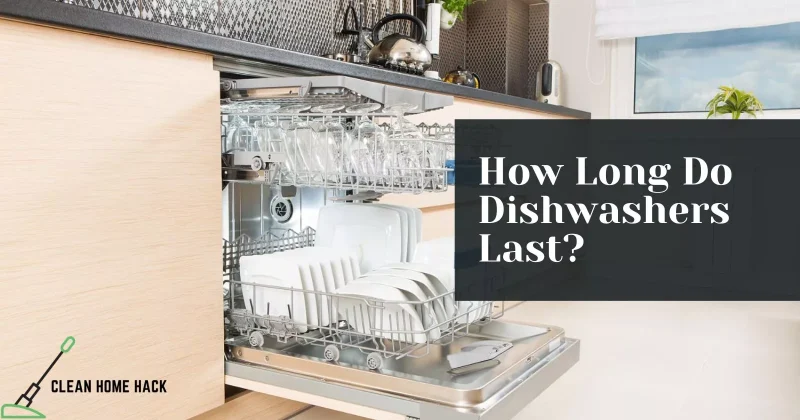How Long Do Dishwashers Last? (6 Tips for Extending Life Dishwasher)

 The Short Answer is: The Short Answer is: |
| On average, a dishwasher should last around 10 years. However, the lifespan of a dishwasher can be affected by factors such as the quality of the dishwasher, frequency of use, and home water quality. Some manufacturers boast a longer lifespan, with Miele dishwashers lasting up to 20 years. To extend the lifespan of a dishwasher, it is recommended to load it correctly, keep it clean, maintain and repair it regularly, and avoid running it too often. |
Dishwashers are a staple in most modern kitchens, providing a convenient and efficient way to clean dishes. However, like all appliances, they have a limited lifespan. The average lifespan of a dishwasher is around 10 years, depending on the brand, model, and maintenance.
While some manufacturers boast a longer lifespan, it is important to know how to extend the life of your dishwasher to get the most out of it. In this article, we will explore the topic, “How Long Do Dishwashers Last“, factors that affect their lifespan, and tips on how to keep them in top shape.
Table of Contents
Average Lifespan of a Dishwasher
The average lifespan of a dishwasher is around 10 years, with some lasting up to 12 years. However, the lifespan of a dishwasher can be affected by several factors, including the brand, model, maintenance, and frequency of use.
While most manufacturers produce dishwashers with a lifespan of a decade on average, some brands like Miele boast a longer lifespan of at least 20 years. If you want your dishwasher to last as long as possible, it is important to take good care of it.
Routine maintenance such as keeping the filter clean, avoiding overloading, and using the right detergent can help extend the life of your dishwasher.
Factors Influencing Dishwasher Longevity
Several factors can influence the lifespan of a dishwasher. Here are some of the most important factors that can affect the longevity of your dishwasher:
- Usage: The more you use your dishwasher, the faster its parts will wear out. Dishwashers are designed to last around 10 years, with most lasting between 8 and 12 years before breaking down. To extend the lifespan of your dishwasher, avoid running it too often and wait until it is full before starting a cycle.
- Quality: The build quality of the dishwasher can also affect its lifespan. Opting for a dishwasher from a recognized manufacturer can increase the chances of purchasing a machine that will last longer.
- Maintenance: Proper maintenance can help extend the life of your dishwasher. Routine maintenance such as keeping the filter clean, avoiding overloading, and using the right detergent can help extend the life of your dishwasher.
- Water quality: The quality of the water in your home can also affect the lifespan of your dishwasher. Hard water can cause mineral buildup, which can damage the dishwasher’s components over time.
- Energy efficiency: Purchasing an energy-efficient dishwasher can help reduce water usage, which can affect tubing, gaskets, filters, and other dishwasher parts, which can ultimately compromise how long it lasts.
By understanding these factors, you can take steps to extend the life of your dishwasher and avoid costly repairs or replacements.
Signs Your Dishwasher May Be Nearing the End
Dishwashers are a convenient and essential appliance in most modern kitchens. However, like all appliances, they have a limited lifespan.
Knowing when to replace your dishwasher can save you from costly repairs and replacements. Here are some signs that your dishwasher may be nearing the end:
- The door won’t latch: If the door to your dishwasher won’t latch, it may be a sign that your dishwasher is dying.
- Dirty dishes: If your dishwasher finishes a cycle, and the dishes are still dirty, it may be a sign that your dishwasher is not doing its job.
- Rust: Rust on the inside or outside of your dishwasher is a sign that it’s starting to break down.
- Strange noises: If you hear strange noises during the cycle, it may be a sign that your dishwasher is starting to break down.
- Standing water: If you open the door to your dishwasher after a cycle and see water pooled at the bottom, it may be a sign that your dishwasher isn’t draining properly.
- Spotty dishes: If you open the door to your dishwasher after a cycle and see spotty dishes, it may be a sign that your dishwasher isn’t cleaning properly.
- Older model: Older models of dishwashers are less efficient, especially if it’s a lower-end brand. If your dishwasher is more than 10-15 years old, it might be time to start thinking about upgrading to a new one.
By understanding these signs, you can take steps to replace your dishwasher before it breaks down completely.
Tips for Extending the Life of Your Dishwasher
Here are some tips to help extend the life of your dishwasher:
- Clean the dishwasher filter: The dishwasher filter needs to be cleaned regularly or whenever you notice that your dishes feel gritty after a wash. Food buildup has to go somewhere in your dishwasher, and for most modern dishwashers, this location is the dishwasher filter.
- Use a descaler if you have hard water: Hard water can cause mineral buildup, which can damage the dishwasher’s components over time. If possible, use a regeneration salt in the dishwasher’s water softening system to address the hard water problem directly.
- Make sure the water running to your appliance is hot: Hot water is essential for cleaning dishes effectively and efficiently. If the water running to your dishwasher is not hot enough, it can affect the dishwasher’s performance and lifespan.
- Don’t use your dishwasher incorrectly: Certain habits can wear down your dishwasher faster by breaking down mechanical parts and clogging the drain hose. Avoid overloading your dishwasher, using the wrong detergent, and running it too often.
- Clean the spinning arms: The spinning arms in your dishwasher are responsible for spraying water onto your dishes. Over time, they can become clogged with food particles and other debris, which can affect the dishwasher’s performance.
- Clean the edges and exterior: Dirt and grime can accumulate on the edges and exterior of your dishwasher, which can affect its appearance and performance. Wipe down the edges and exterior regularly to keep your dishwasher in top shape.
By following these tips, you can extend the life of your dishwasher and avoid costly repairs or replacements.
When to Consider Dishwasher Replacement
Replacing a dishwasher can be a significant investment, so it’s important to know when it’s time to replace your old one. Here are some signs that it may be time to consider replacing your dishwasher:
- Frequent breakdowns: If your dishwasher requires frequent repairs and is no longer reliable, it may be more cost-effective to replace it.
- Inefficiency: Older dishwashers may be less energy-efficient, leading to higher utility bills. Upgrading to a more efficient model can help save energy and money in the long run.
- Aesthetic considerations: If you’re remodeling your kitchen or updating its style, replacing your dishwasher can contribute to the overall look and functionality.
- Age: The average lifespan of a dishwasher is around 10 years, with some lasting up to 12 years. If your dishwasher is approaching or exceeding this age, it may be time to consider replacing it.
- Rust or other damage: If your dishwasher has visible rust or other damage, it may be time to replace it.
- Poor performance: If your dishwasher is no longer cleaning dishes effectively or is leaving spots on dishes, it may be time to replace it.
By understanding these signs, you can make an informed decision about when to replace your dishwasher. If you do decide to replace your dishwasher, be sure to consider factors such as size, capacity, and energy efficiency when selecting a new one.
Eco-Friendly Disposal of Old Dishwashers
When it’s time to replace your old dishwasher, it’s important to dispose of it properly to minimize its impact on the environment. Here are some eco-friendly ways to dispose of your old dishwasher:
- Sell or donate it: If your old dishwasher is still in good working condition, consider selling it or donating it to someone who needs it. You can also check with local thrift stores like the Salvation Army and Goodwill to see if they accept old appliances.
- Recycle it: Many communities have recycling programs that accept old appliances. Check with your local recycling center to see if they accept dishwashers. Some retailers also offer recycling programs for old appliances when you purchase a new one.
- Hire a professional: If you’re not comfortable disposing of your old dishwasher yourself, consider hiring a professional to do it for you. Many companies specialize in eco-friendly appliance disposal and can ensure that your old dishwasher is disposed of properly.
- Check with your local government: Some local governments offer special programs for the disposal of large appliances like dishwashers. Check with your local government to see if they offer any programs or services for appliance disposal.
By disposing of your old dishwasher properly, you can help reduce its impact on the environment and ensure that its components are recycled or disposed of safely.
Frequently Asked Questions Related to the Topic:
Is it worth repairing a dishwasher?
Whether it’s worth repairing a dishwasher depends on several factors, including the age of the dishwasher, the cost of the repair, and the overall condition of the appliance. If your dishwasher is relatively new and the repair is minor, it may be worth repairing.
However, if your dishwasher is old and requires a costly repair, it may be more cost-effective to replace it. As a general rule, if the cost of the repair is more than half the cost of a new dishwasher, it’s probably not worth repairing.
How do you know when your dishwasher is dying?
There are several signs that your dishwasher may be dying, including cold dishes, water not draining out of the bottom, rust on the interior fixtures, broken latch, and strange noises during the cycle.
Other signs include poor performance, such as dishes coming out spotty or dirty, and the age of the dishwasher. If your dishwasher is over a decade old and requires frequent repairs, it may be more cost-effective to replace it.
How long do dishwashers last if used everyday?
The lifespan of a dishwasher used every day is shorter than that of a dishwasher used less frequently. On average, a dishwasher lasts ten years when used every other day, but it may only last five to seven years if used daily.
However, the lifespan of a dishwasher can be extended by running it less often, cleaning the dishwasher filter, and using the right wash cycle settings. Other factors that affect the lifespan of a dishwasher include water temperature, quality, and the brand.
Conclusion on How Long Do Dishwashers Last
In conclusion, dishwashers are an essential appliance in most modern kitchens, providing a convenient and efficient way to clean dishes. The average lifespan of a dishwasher is around 10 years, with some lasting up to 20 years.
However, the lifespan of a dishwasher can be affected by several factors, including the quality of materials used, frequency of use and maintenance, water quality, and user behavior.
By considering these factors and taking appropriate measures, such as using high-quality detergents, properly loading the dishwasher, and regularly cleaning the filter and spray arms, you can ensure your dishwasher functions optimally for a longer period of time.
When it’s time to replace your old dishwasher, consider eco-friendly disposal methods such as recycling or donating it.
By understanding the factors affecting the lifespan of a dishwasher and implementing proper care and maintenance, you can maximize its performance and extend its lifespan, saving you money and contributing to a more efficient and reliable dishwasher.







